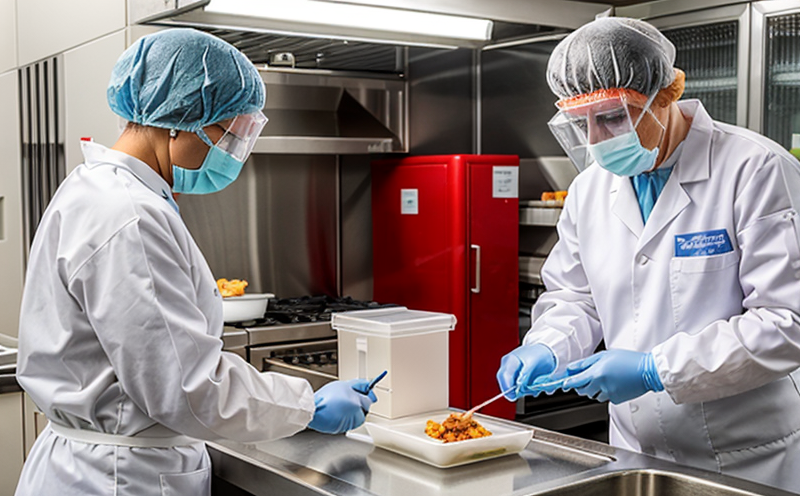Foodborne Virus Testing
The global food industry faces significant challenges in ensuring the safety and quality of products consumed by millions. Foodborne viruses are a major concern, as they can cause severe illness and even death if not properly controlled during production, processing, and distribution. In recent years, several high-profile outbreaks have underscored the critical need for robust testing methodologies to identify and mitigate these risks.
Foodborne virus testing involves the detection of pathogens like norovirus, hepatitis A virus, and rotavirus in food products. These viruses can contaminate food through various means, including contaminated water sources, poor hygiene practices, or cross-contamination during processing. The primary goal of this testing is to ensure that food products are safe for consumption by detecting the presence of harmful viruses at early stages.
The process typically involves sampling food items from various points in the supply chain, such as raw materials, intermediate products, and finished goods. Samples are then analyzed using advanced laboratory techniques like reverse transcription polymerase chain reaction (RT-PCR), enzyme-linked immunosorbent assay (ELISA), and nucleic acid sequencing. These methods allow for sensitive detection of viral RNA or DNA, enabling accurate identification of the specific type of virus present.
Once identified, the testing results are used to implement corrective measures in the production process. This could involve quarantining contaminated products, implementing stricter hygiene protocols, or even recalling affected batches from distribution channels. The ultimate aim is to prevent the spread of foodborne illnesses and maintain public health standards.
In addition to ensuring product safety, foodborne virus testing plays a crucial role in regulatory compliance. Regulatory bodies such as the World Health Organization (WHO), Food and Agriculture Organization (FAO), and various national food safety agencies have established guidelines for detecting and controlling foodborne viruses. Adhering to these standards not only protects consumer health but also helps maintain a company's reputation and market position.
The use of advanced testing techniques in foodborne virus detection has significantly improved the accuracy and speed of identifying pathogens. However, it is essential to ensure that laboratories conducting this testing adhere to strict quality control measures. This includes using calibrated equipment, trained personnel, and standardized procedures. Regular calibration and validation of test methods are critical to maintaining reliability and consistency across multiple samples.
Furthermore, the implementation of traceability systems allows for efficient tracking of food products throughout the supply chain. By linking specific batches or lots with their testing results, companies can quickly identify potential sources of contamination and implement targeted interventions. This approach enhances overall food safety by minimizing the risk of widespread outbreaks.
Why Choose This Test
- Ensure compliance with international standards and regulations such as WHO, FAO, and national food safety agencies.
- Identify and eliminate potential sources of contamination early in the production process.
- Minimize the risk of foodborne illness outbreaks by detecting pathogens at their earliest stages.
- Enhance product reputation and maintain market position through consistent quality assurance.
- Avoid costly recalls and legal disputes by proactively addressing safety concerns.
The Foodborne Virus Testing service offers comprehensive support for companies in the food and feed industry. By leveraging cutting-edge laboratory facilities and experienced technical staff, we provide reliable results that meet stringent standards. Our commitment to accuracy, speed, and efficiency ensures that your products are safe and compliant with all relevant regulations.
Quality and Reliability Assurance
- We follow ISO 17025 accreditation for our laboratory practices to ensure consistent quality.
- Our team of experts uses validated methods that adhere to international standards like WHO, FAO, and national guidelines.
- Regular calibration and validation of equipment guarantee accurate results every time.
In addition to technical excellence, we also emphasize the importance of traceability in our testing processes. By linking each sample with its corresponding test result, we provide a transparent record that supports swift decision-making in case of any issues. This approach not only enhances reliability but also fosters trust between suppliers and consumers.
The Foodborne Virus Testing service is designed to meet the diverse needs of various stakeholders within the food industry. Whether you are a manufacturer looking to ensure product safety, a supplier seeking compliance verification, or an R&D engineer exploring new methods for pathogen detection, our services offer tailored solutions that align with your objectives.
Environmental and Sustainability Contributions
The Foodborne Virus Testing service also contributes to environmental sustainability by promoting responsible food production practices. By identifying and addressing potential contamination sources early in the process, we help minimize waste and reduce the need for costly recall actions. This proactive approach supports a circular economy model where resources are used efficiently without unnecessary losses.
Additionally, our testing methods contribute to resource conservation through optimized sampling strategies and efficient use of reagents. By reducing the amount of material required for each test while maintaining high levels of accuracy, we help preserve natural resources and reduce the environmental footprint associated with food safety testing.
The Foodborne Virus Testing service aligns with broader sustainability goals by fostering a culture of responsibility within the food industry. By working closely with clients to develop sustainable practices that enhance product safety, we contribute to long-term benefits for both businesses and society as a whole.





